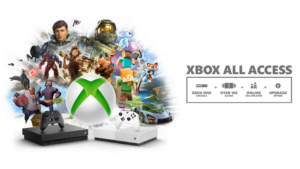Console sales cycles may just have changed forever
While all eyes have been on Google’s forthcoming Stadia, it may actually be Microsoft who have just completely upended the traditional console sales cycle model.

Since the introduction of the very first games console the Magnavox Odyssey, way back in 1972, consumers have bought a console outright (credit card or store repayment plans notwithstanding) and used it until the next generation of consoles was released. Then, if they want to access the latest games, they have purchased the next generation console, and so the cycle has continued. Enter Microsoft Xbox All Access.
Marketing hype has always been a crucial driver of early adoption of next gen consoles. Since the early days of Sega vs Nintendo, to the current Microsoft vs Sony vs Nintendo, brands have typically started the hype machine about a year ahead of release. Their aim, to ensure the customer base doesn’t leap to a competitor. Of course, talking about how game-changing their next console is going to be, has a knock-on effect to the sales of both their current generation of hardware, and software. Why would you invest hundreds of pounds in something which is going to be obsolete in the near future?
So, what have Microsoft done to change this? With the introduction of Microsoft Xbox all access, consumers now have access to a subscription model for console hardware. For £19.99 or £24.99 per month, depending on whether you want an Xbox One S or its more powerful relative the one X, customers will receive the current generation console. Then, when its successor is released, they have the option of upgrading their package to the new one, much like the traditional mobile phone sales model. This approach has the potential to not only lock in new customers to the Xbox platform over its competitors, but also potentially gives Microsoft a headstart in the upcoming next-gen console war. Why would you pay hundreds for Sony’s console, when you can access Microsoft’s for your monthly fee?
Games? They have this covered as well. In an effort to make this as universally appealing (nay, irresistible) as possible, Microsoft have gone even further. Folding in their Netflix-esque games-pass subscription, Microsoft are giving gamers an instant library of 100+ games to play, from classics to day one releases of AAA block busters from their ever-growing list of Microsoft Studios. Additionally, access to the Xbox Live online service is included as well. For 24 months. That’s a (Microsoft estimated) saving of around £100 should customers purchase these services separately.
There is a potential concern though. In an age where many gamers own more than one home console in order to access console exclusives, this sort of subscription model risks pricing multi-console gamers out. By the time Microsoft’s new console arrives, it will have been at least seven years since its predecessor the Xbox One was released at around £429. If the next Xbox doesn’t release for another seven years, and subscribers continue pay £24.99 a month for their console and Xbox Game Pass Ultimate package, they would be looking at a cost of £2,099.16 over the period. This is £747 more than if they bought the console outright and subscribed to Xbox Game Pass Ultimate separately. At time of writing, this is of course completely hypothetical. We don’t yet know what upgrade package users will be offered, once the new console arrives. Nor do we know, as we head into a potentially cloud based future, when or even if a successor to that will be released. However, if subscriptions become the new normal for gamers and prices remain significantly higher that their television streaming counterparts, we may soon be faced with having to choose just one device or provider.
One thing is for sure; with the upcoming addition of Microsoft’s game streaming service Project xCloud currently in closed public beta, a plethora of games studio purchases, and a loyal user base of millions, right now Microsoft may well be in a position to take Google’s Stadia and everyone else on, head-on. So, the ground is laid. It’s going to be fascinating to see how Sony, Nintendo and Google respond.
Let the console wars recommence.
James Dodd
Martin Tripp Associates is a London-based executive search consultancy. While we are best-known for our work across the media, information, technology, communications and entertainment sectors, we have also worked with some of the world’s biggest brands on challenging senior positions. Feel free to contact us to discuss any of the issues raised in this blog.